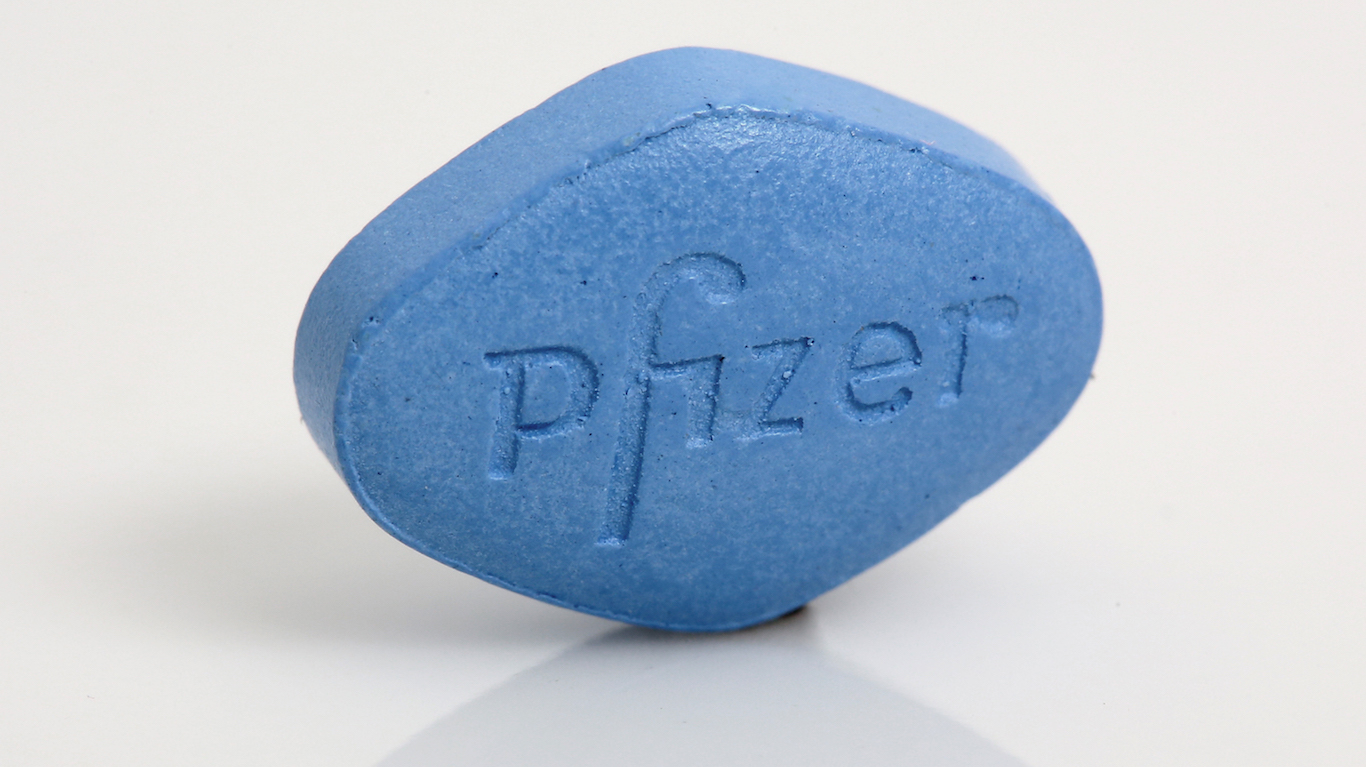
It takes a certain kind of courage to short sell blue chips, such as the Dow Jones industrial average components. Short sellers are betting on these companies to fail, or at least for their share prices to fall handily. Plus, those sellers are responsible for paying the dividends on the stocks they short.
Maybe it is little wonder that only one of the 30 Dow stocks have had notable short interest lately; that is, at least 100 million shares short. In fact, five of them had short interest of more than 40 million shares.
Yet the bull market is quite long in the tooth — now more than 10 years old — and concern about a coming recession is rising. Investors may wonder then what the short sellers expect from some of the biggest, most well-respected names on Wall Street.
As of the March 15 settlement date, the most recently reported period, short sellers favored Pfizer Inc. (NYSE: PFE), Apple Inc. (NASDAQ: AAPL) and Intel Corp. (NASDAQ: INTC) above all other Dow stocks.
Pfizer
> Shares short: 103.49 million
> Change from prior period: −25.1%
> Percentage of float: 1.8
Even added to the more than 11% decline in the prior period, this only reclaimed a little of the almost 265% rise in early January to the greatest level of short interest at Pfizer so far this year. At the end of January, less than 43 million shares were short. And at the daily average volume on the most recent settlement date, it would take more than three days for short sellers to cover their positions.
Pfizer recently has made moves to expand its footprint in gene therapy. By the end of the initial two weeks of March, the share price had pulled back more than 3%, though it had been down almost 7% at one point in the period. The Dow ended the short interest period a little more than 1% lower.
The stock closed Tuesday’s trading at $42.42 a share, about the same as it was a week ago. Pfizer’s 52-week low of $34.37 was seen last spring, and the 52-week high of $46.47 was from this past December. Shares are down almost 3% year to date.
Apple
> Shares short: 72.75 million
> Change from prior period: −24.9%
> Percentage of float: 1.5
Note that the number of Apple shares short more than doubled in the latter weeks of February, with the average daily trading volume falling to a year-to-date low. By the most recent settlement date, the number of days it would take for investors to cover all their short positions shrank from more than four to less than three.
The iPhone maker has been one of the top companies in terms of buying back its own shares. Short sellers watched the share price rise almost 7% by the most recent settlement date, though it had been down about 2% earlier in the period. The Nasdaq saw a gain of less than 2% during those two weeks.
After gaining and losing about 6% in the past week, Apple stock ended trading most recently at $186.79 a share. That was in a 52-week range of $142.00 (at the beginning of this year) to $233.47 (last October). The share price currently is more than 18% higher than at the beginning of this year.
Intel
> Shares short: 57.09 million
> Change from prior period: 5.8%
> Percentage of float: 1.3%
Intel’s short interest has now risen for the second period in a row and is nearly back to where it was at the end of January. That is still well short of the year-to-date high of 104 million or so. As of the middle of this month, it would take more than two days for investors to cover all their short positions.
Intel lost out on a big acquisition recently, a potential blow to its data center CPU dominance. The March 15 closing share price was less than 2% higher than on the previous settlement date, a bit better than the S&P 500, though the share price pulled back somewhat afterward.
Intel was last seen trading at $53.44 a share, down modestly from the multiyear high of $57.60 hit last June. The 52-week low is $42.36 per share. And the latest share price is about 14 higher than at the beginning of the year, also better than the S&P 500.
And the Rest
Rounding out the top five most shorted Dow stocks on the most recent settlement date were Microsoft Corp. (NASDAQ: MSFT) and Cisco Systems Inc. (NASDAQ: CSCO). Note that despite the notable drop in Apple’s short interest, the number of shares short of the other Dow tech stocks that crowd the top of the list increased somewhat.
Also notice on the full list of the Dow stocks ranked by number of shares short as of March 15 how many saw double-digit percentage increases in the first two weeks of this month:
| Dow Stock | Short (millions) | Change | % Float |
|---|---|---|---|
| Pfizer | 103.49 | −25.10% | 1.80% |
| Apple | 72.75 | −24.90% | 1.50% |
| Intel | 57.09 | 5.80% | 1.30% |
| Microsoft | 44.89 | 9.10% | 0.60% |
| Cisco | 44.23 | 7.40% | 1.00% |
| Exxon | 43.30 | 34.20% | 1.00% |
| Disney | 43.26 | 23.30% | 2.90% |
| Merck | 38.68 | −2.50% | 1.50% |
| Verizon | 32.18 | 13.20% | 0.80% |
| Visa | 30.94 | 9.50% | 1.80% |
| Coca-Cola | 29.35 | 22.00% | 0.70% |
| Walgreens | 25.42 | 7.00% | 3.20% |
| Procter & Gamble | 24.68 | 9.80% | 1.00% |
| DowDuPont | 23.32 | 4.00% | 1.00% |
| Walmart | 20.13 | 11.80% | 1.40% |
| Chevron | 19.24 | 21.30% | 1.00% |
| JPMorgan | 18.54 | 5.20% | 0.60% |
| IBM | 15.87 | 22.00% | 1.80% |
| Johnson & Johnson | 13.07 | 24.60% | 0.50% |
| Nike | 10.26 | 18.10% | 0.80% |
| 3M | 9.81 | 12.10% | 1.70% |
| Home Depot | 9.60 | 14.60% | 0.90% |
| American Express | 8.73 | 23.10% | 1.00% |
| Caterpillar | 7.68 | −13.60% | 1.30% |
| United Technologies | 7.16 | 27.60% | 0.80% |
| UnitedHealth | 6.50 | 5.70% | 0.70% |
| Goldman Sachs | 6.31 | −17.40% | 1.80% |
| McDonald’s | 6.25 | 6.70% | 0.80% |
| Boeing | 4.92 | 1.10% | 0.90% |
| Travelers | 3.67 | 8.80% | 1.40% |
Credit card companies are handing out rewards and benefits to win the best customers. A good cash back card can be worth thousands of dollars a year in free money, not to mention other perks like travel, insurance, and access to fancy lounges. See our top picks for the best credit cards today. You won’t want to miss some of these offers.
Flywheel Publishing has partnered with CardRatings for our coverage of credit card products. Flywheel Publishing and CardRatings may receive a commission from card issuers.
Thank you for reading! Have some feedback for us?
Contact the 24/7 Wall St. editorial team.
 24/7 Wall St.
24/7 Wall St. 24/7 Wall St.
24/7 Wall St.


